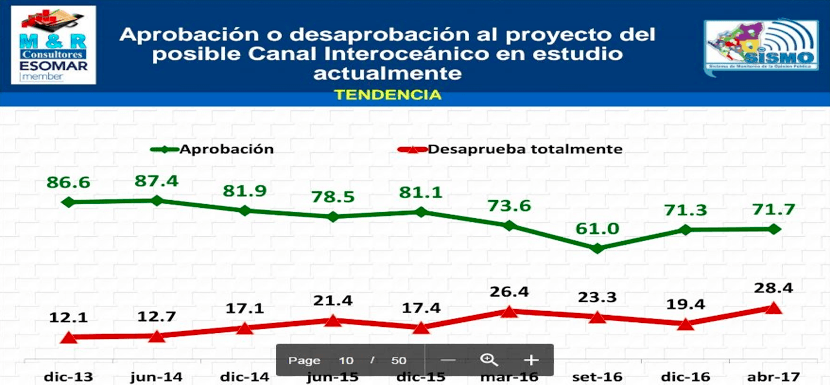News of the proposed Gran Canal went quiet over the last few months of 2016 and the first few months of 2017. It is open for debate and speculation whether this might be due to:
- The decline in the fortune of Wang Jing, owner of the HKND company which has the canal concession; or
- The Sandinista government’s stated policy that all the environmental impact analyses have to be finished before work can begin; or
- The Chinese government putting the project on hold as a reward to Panama for cutting off its links with Taiwan; or
- The current lack of attraction to international financial investment, made especially precarious because of Trump’s commitment to protectionism.
Which of these ‘theories’ holds any degree of truth I do not know, but later this year when more of the second series of environmental impact analyses are reported, we may gain a better understanding of the issues.
In the meantime, in April this year (2017) La Prensa (Managua) reported on an M&R poll of Nicaraguan attitudes to the canal project.
M&R poll: 71% still support the Canal
From: La Prensa (Managua) | By: Leonor Álvarez | 24/04/2017 | Translated by ENCA supporter Theodora Bradford
Approval of the Interoceanic Canal project has fallen since the project was announced in 2013, according to the results of a survey of 1,600 Nicaraguans, by M & R Consultants. The survey corresponds to the first quarter of this year. It was carried out face to face between the 17th of February and the 24th of April of this year, in the 15 departments and two autonomous regions of the country. It has an error margin of more or less 2.5 percent and a confidence level of 95 percent.

Since December 2013, when the pollster, led by Raúl Obregón, began to ask about the Canal project, disapproval has grown by 16.3 percent. In December 2013, disapproval was at 12.1 percent; in December 2014, 17.1; in June 2015, 21.4 percent; in December 2015, 17.4 percent; in March 2016 26.4 percent; in December 2016, 19.4 and in April 2017, 28.4 percent.
In the most recent poll, 63.4 percent of interviewees said they believed that the Canal project would go ahead if studies determined it to be feasible, while 31.9 percent responded that it was ‘unrealistic’ and that there would be no canal. Some 4.8 percent said they didn’t know or didn’t respond.
On the 22nd of April, campesinos mobilised against the Bill for the Interoceanic Canal (Law 840) called for a national march in Juigalpa, Chontales, that was obstructed by the National Police.
According to official information, the construction of the Canal would involve the investment of 50,000 million dollars to be completed in five years. Canal critics have pointed out that this would affect the natural reserves that stand in the way of the canal route and have also made the analysis that the concession law hands sovereignty over to the Chinese businessman.